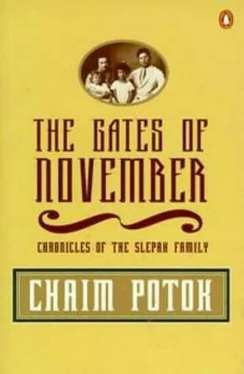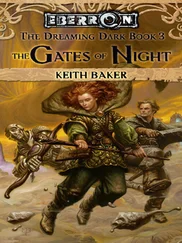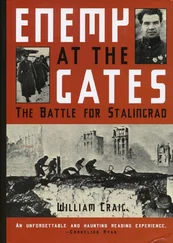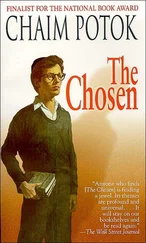In Siberia, Volodya had counted the days with care. He knew precisely how long he had served in exile and how much time he had left. You counted from the day of your arrest, knowing that according to Soviet law, one day in prison or in a prison railway car was equal to three days of exile. He knew, too, that after his exile he would lose his Moscow residency permit and might be ordered by the authorities to live beyond the 100-kilometer (62.5-mile) city limit. Technically he and Masha were still divorced; they had hoped all the years that the divorce might have gained Masha an exit visa-vainly, as it turned out. In January 1982, at the beginning of their last year of exile, they went to the village soviet and were remarried. It was now possible for Volodya to apply for and obtain a Moscow residency permit.
Later that winter there was a violent snowstorm that melted too quickly in a sudden thaw. A powerful stream tore through the houses, and for four days much of the village lay deep in water. Houses collapsed. Pigs, dogs, calves, sheep perished.
With the spring rain the steppes returned to life: pink, yellow, and white blossoms, poppies, tulips, grasshoppers, birds, butterflies. It was a brief life, lasting about one month. The summer came, and with it winds from the Gobi Desert carrying blast furnace heat. And dust. The moisture in one’s eyes dried. And in one’s mouth and nostrils. The humidity was 10 percent. Volodya began to cough. Masha wet down bedsheets and hung them about the apartment.
Fall and winter came. Masha marked the time on the wall calendar, every morning crossing out a day. They began to sell off some of their possessions, gave some away; they packed and sent things to Moscow.
Volodya’s appointed day of release was December 2, 1982. Several days before, he called the airport in Chita and booked two tickets on a flight to Moscow.
On the day of his release he and Masha took the bus to Aginskoye. In the militia station he picked up his internal passport and all the documents he needed. They spent the night in a hotel in Aginskoye and took the morning bus to Chita. Masha gazed out the dusty window at the steppes, the hills, the forests, the valleys. Five years of their lives, gone. Because of a balcony demonstration. For a postcard from OVIR. On the seat beside her Volodya slept.
It was dark when they arrived in Chita, and they stayed that night in the airport hotel. At about four o’clock the next morning, in freezing air, they boarded the flight to Moscow and arrived early Sunday morning, December 4.
When Volodya emerged from the Moscow airport terminal, he had the eerie sensation that he had never left the city. Five years, and nothing seemed to have changed. Streets, buildings, trams, traffic, clothes, shops. Dirty snow on the streets, an icy wind. Moscow frozen in time.
In the apartment on Gorky Street the woman who occupied the third room appeared genuinely happy to see him. Everything about the apartment-the walls, the furniture, the floors, the windows-was the same as when he had departed. Except the front door. The old, broken door, smashed during one of the many KGB searches of the apartment, had been replaced by a new wooden door, painted the identical brown as the previous one. Masha called relatives and friends. Volodya was home! Yes, home. Safe. Excitement, joy.
Volodya wanted to reapply immediately for an exit visa but couldn’t, because he no longer had a Moscow residence permit. Masha went with him to the local militia station to apply for the permit, and the officer in charge of residence permits said it would be necessary for them to turn in their internal passports while the application was processed. They handed him their passports.
Weeks went by. Volodya repeatedly called the officer, who said he could do nothing for them; he had sent on the application to his chiefs and was himself waiting for their decision. Eleven months after Volodya turned in the application, it was approved. Residence permit in hand, he applied to OVIR for an exit visa. The answer came one month later. Refused. The reason: “Secrecy.”
On the day he received the residence permit, indeed at the same time it was being stamped into his internal passport at the local militia station, Volodya was told to see another officer in that station. The officer warned him that because he hadn’t worked in months, he was about to be indicted and brought to trial as a parasite; he had two weeks to find a job. Volodya said that he hadn’t even been able to look for a job because he hadn’t had his internal passport, which had been taken from him in that same militia station. The officer said that was no affair of his, it was a different department.
His friends helped him find a job as an elevator operator in a hospital. Working nights, he discovered that if he halted the elevator between certain floors, he was able to penetrate the Soviet jamming of overseas radio broadcasts. He began to listen again to the voices of the West, in that way keeping himself aware of the worldwide activities of the movement: demonstrations wherever high Soviet officials appeared, at political meetings, cultural events, scientific conferences, conventions of judges and lawyers. There was continuing unrest because of the refuseniks.
At the Geneva Summit conference in December 1985-in the wake of the sudden deaths of Soviet Premiers Andropov in 1984 and Chernenko in 1985-the plight of Soviet Jewry was mentioned to the new Soviet premier, Mikhail Gorbachev, by President Ronald Reagan. Demonstrators hoisted placards and marched through downtown streets. Avital Shcharansky displayed a photograph of her imprisoned husband, and Jesse Jackson asked the Soviet premier about the Jews and was informed that the “so-called problem of Jews in the Soviet Union does not exist.” Such events were widely reported by the media; they filtered out of the small radio Volodya held to his ear when he stopped the elevator during the quiet moments of the night and went searching for cracks in the wall of Soviet jamming.
After a year as an elevator operator, he was promoted to the job of controller. From behind a desk in a small office, he ran the hospitals electricity, water supply, sewage, and heating systems. Problems in those systems were directed to him; he called the electricians, plumbers, repair crews.
In February 1986 Shcharansky was released, to everyone’s joy and surprise. He flew off to a tumultuous welcome in Israel.
Between 1968 and 1986, nearly 270,000 Jews, 12.5 percent of Soviet Jewry, had emigrated. But there were about 10,000 refuseniks in the USSR in 1986, among them Masha and Volodya, whose names and long struggle were by then legendary. Elie Wiesel talked about them often-to American senators, to men and women in the House of Representatives, to government officials in France, to Gorbachev.
The likelihood of freedom for the refuseniks seemed dim. Some for whom hope of release was now dead had decided to turn their efforts at emigration inward, to create for themselves and their children a new Jewish culture inside the Soviet Union, in defiance of Soviet law. Secret religious schools for children; clandestine places of prayer and study for adults; illegal lectures on Jewish history and customs; furtive Purim and Hanukkah parties; covert Hebrew songfests in forests-all in place of the efforts previously expended on petitions, sit-ins, demonstrations, hunger strikes, now regarded as futile.
The Israelis did not take kindly to such activities, thought them a yielding to the Soviet effort to stifle Jewish emigration, a waning of the refuseniks’ Zionist enthusiasm. On this matter Volodya tended to agree with the Israelis, who regarded him as one of their greatest assets.
In March 1986 he and Masha exchanged their single large communal apartment on Gorky Street for two small apartments. They moved into a six-story building on Vesnina Street, about a twenty-minute walk to the Kremlin. The woman and her son, their Gorky Street neighbors, went willingly into the second apartment in a different section of Moscow. Quite small, the apartments, but unshared, private. The Slepak apartment had two rooms, one with a balcony. And a telephone, which the KGB for some reason had not thought to shut down. On the first floor of the building were a bookstore and a hairdresser’s shop. Soon visitors were finding their way to the new lodgings, Vesnina Street 8/10, apartment 52. Volodya again sat listening, smoking his pipe, talking. And Masha served tea and sugar cookies, hovered in the background, and worried about her husband’s health.
Читать дальше












